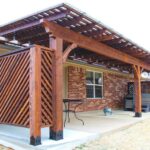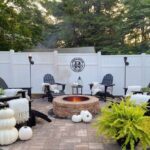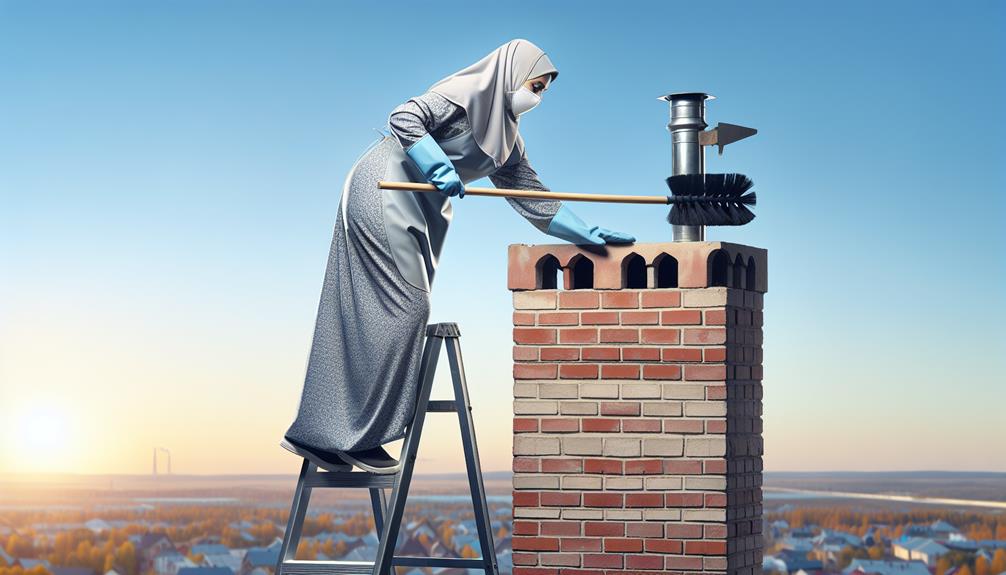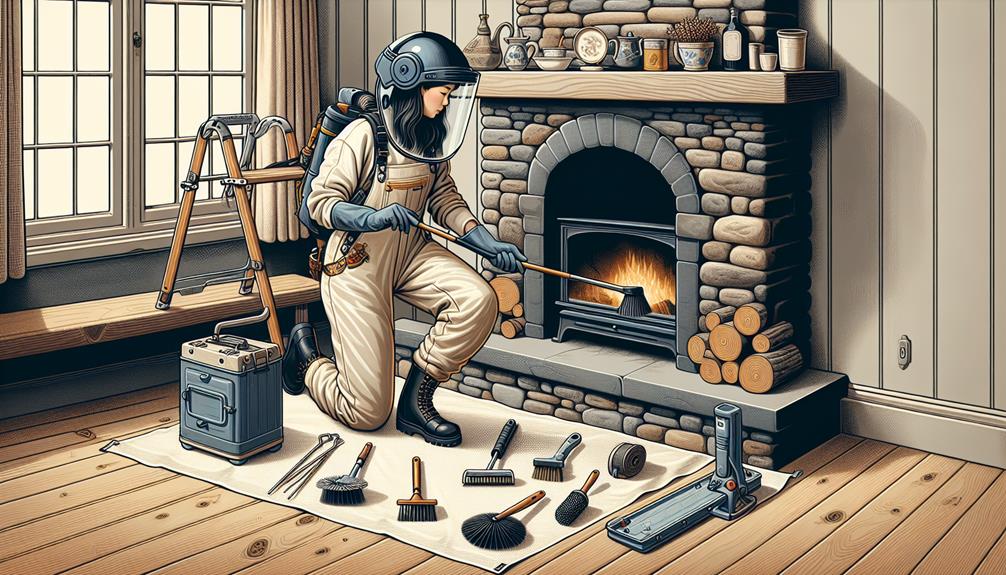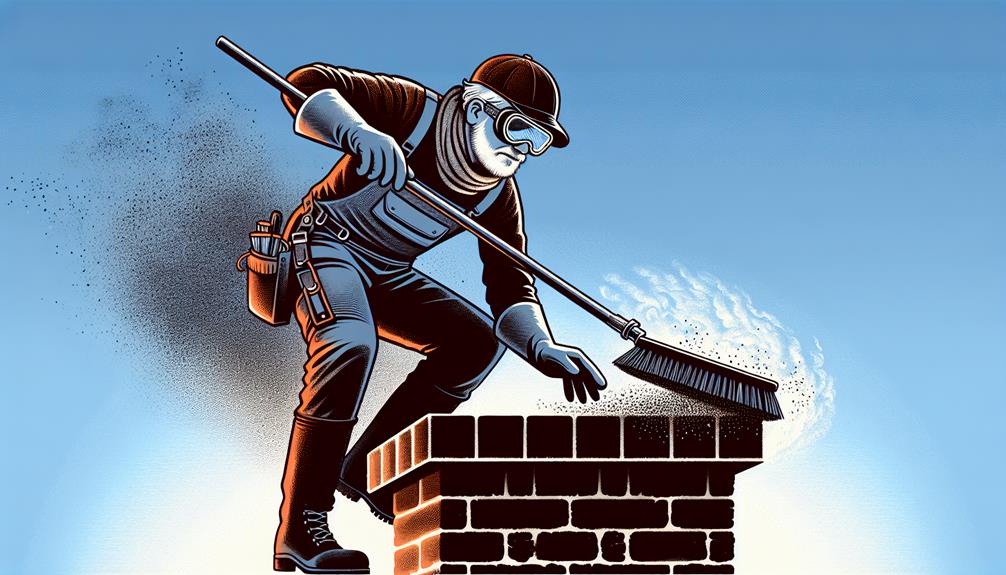Do chimney sweeps work in the rain?
Yes, they do. Rain can make their job harder and riskier, but they still continue their services.
Safety Concerns During Rainy Weather
When it’s rainy, chimney sweepers face more danger working on slippery roofs. It’s harder to see clearly and easier to slip and fall. Rain makes it tough to spot chimney problems, increasing the risk for inspectors.
Leaks can also be more of a problem in wet weather. To stay safe, chimney sweepers need to be extra careful and follow safety rules when working on rainy days. By putting safety first, they can make sure the inspection goes smoothly and without accidents.
Hazards of Working on Wet Roofs
Working on wet roofs is risky for chimney sweeps because they can slip and fall easily. The visibility is also poor, making it hard to see the chimney properly. This can lead to accidents and injuries for the sweeps and damage to the property they’re working on.
It may also affect the quality of the inspection, causing potential safety issues with the chimney.
Impact of Rain on Chimney Components
Inspecting chimneys in the rain helps to identify leaks and water damage more easily. Rain makes it clear where water is seeping in and causing problems.
It can also show cracks or weak spots that need fixing. So, checking chimneys when it’s raining can prevent further damage by spotting issues early on.
Risks of Accidents and Injuries
Chimney sweep technicians face more risks of accidents and injuries in rainy weather. Rain makes surfaces slippery, increasing the chance of chimney sweep technicians slipping and falling. Wet roofs are dangerous for inspectors during chimney sweeps in the rain because they can struggle to stay steady.
Rain also reduces visibility on the roof, making it harder for inspectors to see where they’re going. Using ladders in wet conditions is very risky and can harm chimney sweep technicians. Inspectors may have trouble seeing the top of the chimney clearly in rainy weather, which makes it hard to spot and fix any issues.
Keeping inspectors safe is crucial during chimney sweeps in the rain to avoid accidents and injuries.
Effectiveness of Cleaning in the Rain
Cleaning chimneys in rainy conditions can be tricky. Here are three things to keep in mind:
- Leak Detection: Rain helps spot leaks in chimneys that might go unnoticed in dry weather. It shows where repairs are needed.
- Safety: Wet roofs make it dangerous for chimney technicians to work. They can easily slip and fall, making it risky.
- Thorough Check: While rain helps find leaks, cleaning chimneys in the rain may not be ideal. It’s harder to do a detailed cleaning job on wet surfaces, which can impact the overall effectiveness of the cleaning process.
Damage to Chimney Structure
Inspecting your chimney regularly is vital to preventing and fixing any damage caused by rain. Rain can weaken the structure over time by damaging the mortar joints in chimneys. If you see rust around your fireplace when it’s raining, it may mean there are moisture issues that need immediate attention.
If you notice broken pieces inside the chimney during rain, it could be a sign of flue damage, which requires urgent inspection and possible repair. Creosote buildup in chimneys, especially in rainy conditions, can increase the risk of fire damage significantly.
To keep your chimney safe and in good condition, it’s best to schedule professional inspections to identify and address any rain-related damage promptly. By acting early to fix moisture problems, you can avoid expensive repairs and maintain a safe chimney system.
Importance of Rescheduling Appointments
If it’s raining, reschedule your chimney sweep appointment for safety reasons. Wet conditions can cause accidents during inspections. Rain can make it hard to access the chimney and affect the service quality.
Moisture on the roof can be slippery and dangerous. Postponing appointments during rain helps keep technicians safe and ensures a better cleaning job later. Safety and quality are key for a long-lasting chimney system.
Ensuring Efficiency and Safety
When checking chimneys in the rain, it’s important to think about safety for the workers and the quality of the service. Rainy inspections can help find leaks and water issues that dry inspections might miss. But it can be risky due to slippery roofs and poor visibility. Even icy conditions can make it tough to inspect chimneys in the rain.
Despite these challenges, it’s crucial to tackle leaking issues and make sure the chimney works well. Some worry that rain or snow might hide problems, but with careful steps and skilled workers, these concerns can be lessened. By focusing on safety and doing thorough checks, chimney sweeps can handle leaks effectively even in tough weather.
Rain’s Influence on Cleaning Quality
When cleaning chimneys in rainy conditions, the damp environment can significantly affect the quality of the service provided. Rain can impact the cleaning process in the following ways:
- Leak Detection: Rain helps technicians spot leaks in the chimney where water is getting in, allowing early detection of potential issues for homeowners.
- Safety Concerns: Wet conditions during rain make it hard for chimney sweeps to safely access and clean the chimney, increasing the risk of slips and falls.
- Assessment Challenges: Rainwater can obscure issues, making it difficult to accurately evaluate the chimney’s cleanliness and safety.
Safety Precautions for Chimney Sweeps
When chimney sweeps work in the rain, they need to be extra careful for their safety. Wet surfaces can be slippery, so it’s important to avoid working on wet roofs to prevent accidents.
Rain can also make it hard to see clearly, increasing the risk of getting hurt. Inspecting chimneys in rainy conditions can be dangerous for the inspectors and the homes they work on.
Using ladders on slippery surfaces is risky during rainy weather. To stay safe, chimney sweepers should take precautions to prevent accidents and create a secure working environment.
Frequently Asked Questions
How Do Chimneys Work When It Rains?
When it rains, chimneys can get wet, showing leaks that are hard to see when it’s dry. But rain also makes it dangerous for workers to check chimneys because the surfaces get slippery, putting them at risk.
Is it OK if rain comes down, Chimney?
Chimney caps can prevent leaks and odors by keeping rainwater out. Regular inspections help catch problems early and protect your chimney.
Is it normal for a chimney to leak when it rains?
Chimneys can leak during rain if the flashing or caps are damaged. This can lead to structural problems and mold. To prevent costly damage, inspect and repair the chimney promptly. Installing chimney caps can help prevent leaks in the future.
Is it normal for rain to drop down chimneys?
If rain drips down your chimney, it could mean there are problems with the chimney cap or flashing. Water coming in can damage your chimney and home. Make sure to maintain your chimney to keep rain out and protect your house. It’s important to keep your chimney in good condition.
Conclusion
When it rains, chimney sweepers have to be careful on wet roofs to stay safe. Rain can help them spot important chimney issues, though.
They might need to reschedule appointments to make sure they work safely and do a good job. By being cautious and adjusting to the weather, chimney sweeps can still do a great job, even when it’s not ideal.
So, next time it rains, think about the hard work and skill of these home maintenance heroes.




